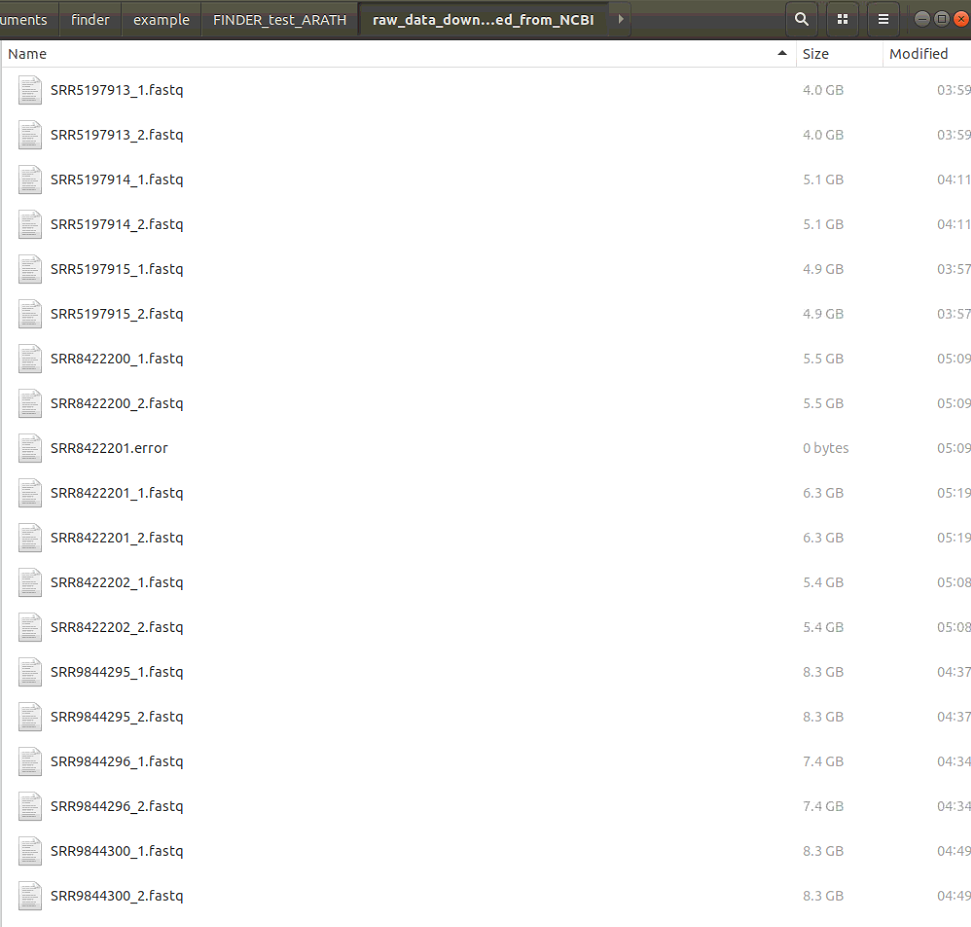2021 9/1 論文追記
2022/12/27 追記
真核生物の遺伝子アノテーションは、蓄積された転写産物のデータを緻密に解析する必要があり、簡単な作業ではない。真核生物の遺伝子アノテーションには、重複する遺伝子を含むゲノムの転写活性領域、多数の転写産物を産生する遺伝子、トランスポサブルエレメント、多数の多様な配列反復などの課題がある。現在市販されている遺伝子アノテーションソフトウェアは、あらかじめ構築された完全長の遺伝子配列アセンブリに依存しており、エラーがないことは保証されていない。また、これらの配列の起源は不確かなことが多く、配列中のエラーを特定して修正することが困難である。そのため、複数の組織や実験条件におけるトランスクリプトームの状況を、正確かつ全体的に表現することができない。そのため、遺伝子構造の多様性を把握するためには、ゲノムワイドな発現データの包括的な解析が不可欠である。
ここでは、遺伝子と転写産物の構造をアノテーションするプロセス全体を最適化する完全自動化の計算ツール、FINDERを発表する。現在の最新のパイプラインとは異なり、FINDERは生のシーケンスリードを直接扱うことでRNA-Seqの前処理ステップを自動化し、これらのリードに関連するタンパク質を補足することでBRAKER2からの遺伝子予測を最適化する。FINDERパイプラインは、(1)転写産物を報告し、特定の条件下で発現している遺伝子を認識する、(2)発現しているRNA-Seqデータから可能性のあるすべての代替スプライス転写産物を生成する、(3)リードカバレッジパターンを分析して既存の転写産物モデルを修正し、新しいモデルを作成する、(4)複数のデータセットにわたる利用可能な証拠に基づいて、遺伝子を高信頼度または低信頼度としてスコアリングする、というものである。FINDERは、8種の多様なゲノムを自動的にアノテーションできることを実証した。FINDERは、完全に自動化されたアプローチで、生の発現データから直接遺伝子をアノテーションすることができる。FINDERは、あらゆるサイズの真核生物のゲノムを処理することができ、手動による監督を必要としないため、計算機ツールの取り扱い経験が少ないベンチ研究者にとって理想的である。
インストール
git clone https://github.com/sagnikbanerjee15/finder.git
cd Finder
mamba env create -f environment.yml
conda activate finder_conda_env
cd dep
#GeneMark-ESとGeneMarkS/Tが必要、ダウンロードしたgmes_linux_64.tar.gzとkeyのgmes_linux_64.gzをカレントに置いてインストールスクリプトを実行(もしくは手動でパスをを通す)
./install.sh
cd gmes_linux_64/
perl change_path_in_perl_scripts.pl /usr/bin/perl
#Docker(hub link)からiamgeをpullしておく。run_finder.shから呼び出されたdocker imageが実行されるので必ず必要。
docker pull sagnikbanerjee15/finder:1.1.0
> finder
Please use the --help option to get usage information
usage: finder [-h] --metadatafile METADATAFILE --output_directory
OUTPUT_DIRECTORY --genome GENOME [--cpu CPU]
[--genome_dir_star GENOME_DIR_STAR]
[--genome_dir_olego GENOME_DIR_OLEGO] [--verbose VERBOSE]
[--protein PROTEIN] [--no_cleanup] [--preserve_raw_input_data]
[--checkpoint CHECKPOINT]
[--perform_post_completion_data_cleanup]
finder: error: the following arguments are required: --metadatafile/-mf, --output_directory/-out_dir, --genome/-g
> run_finder
$ run_finder
Please use the --help option to get usage information
usage: run_finder [-h] [--version] --metadatafile METADATAFILE
--output_directory OUTPUT_DIRECTORY --genome GENOME --organism_model
{VERT,INV,PLANTS,FUNGI} --genemark_path GENEMARK_PATH
--genemark_license GENEMARK_LICENSE [--cpu CPU]
[--genome_dir_star GENOME_DIR_STAR]
[--genome_dir_olego GENOME_DIR_OLEGO] [--verbose VERBOSE] [--protein
PROTEIN] [--no_cleanup] [--preserve_raw_input_data] [--checkpoint
CHECKPOINT]
[--perform_post_completion_data_cleanup]
[--run_tests] [--addUTR] [--skip_cpd] [--exonerate_gff3
EXONERATE_GFF3] [--star_shared_mem] [--framework {docker,singularity}]
run_finder: error: the following arguments are required:
--metadatafile/-mf, --output_directory/-out_dir, --genome/-g,
--organism_model/-om, --genemark_path/-gm, --genemark_license/-gml
(base) kazu@kazu:/media/kazu/8TB5/torenia/RepeatModeler2-default/RM_42413.ThuDec221259252022/repeatmasker2/finder-arabi-test/Finder-master$
run_finder -h
usage: run_finder [-h] [--version] --metadatafile METADATAFILE
--output_directory OUTPUT_DIRECTORY --genome GENOME --organism_model
{VERT,INV,PLANTS,FUNGI} --genemark_path GENEMARK_PATH
--genemark_license GENEMARK_LICENSE [--cpu CPU]
[--genome_dir_star GENOME_DIR_STAR]
[--genome_dir_olego GENOME_DIR_OLEGO] [--verbose VERBOSE] [--protein
PROTEIN] [--no_cleanup] [--preserve_raw_input_data] [--checkpoint
CHECKPOINT]
[--perform_post_completion_data_cleanup]
[--run_tests] [--addUTR] [--skip_cpd] [--exonerate_gff3
EXONERATE_GFF3] [--star_shared_mem] [--framework {docker,singularity}]
Generates gene annotation from RNA-Seq data
optional arguments:
-h, --help show this help message and exit
--version show program's version number and exit
Required arguments:
--metadatafile METADATAFILE, -mf METADATAFILE
Please enter the name of the metadata file.
Enter 0 in the last column of those samples which you wish to skip
processing. The columns should represent the following in order -->
BioProject, SRA Accession, Tissues, Description, Date, Read Length,
Ended (PE or SE), RNA-Seq, process, Location. If the sample is skipped
it will not be downloaded. Leave the directory path blank if you are
downloading the samples. In the end of the run the program will output
a csv file with the directory path filled out. Please check the
provided csv file for more information on how to configure the
metadata file.
--output_directory OUTPUT_DIRECTORY, -out_dir OUTPUT_DIRECTORY
Enter the name of the directory where all
other operations will be performed
--genome GENOME, -g GENOME
Enter the SOFT-MASKED genome file of the organism
--organism_model {VERT,INV,PLANTS,FUNGI}, -om {VERT,INV,PLANTS,FUNGI}
Enter the type of organism
--genemark_path GENEMARK_PATH, -gm GENEMARK_PATH
Enter the path to genemark
--genemark_license GENEMARK_LICENSE, -gml GENEMARK_LICENSE
Enter the licence file. Please make sure your
license file is less than 365 days old
Optional arguments:
--cpu CPU, -n CPU Enter the number of CPUs to be used.
--genome_dir_star GENOME_DIR_STAR, -gdir_star GENOME_DIR_STAR
Please enter the location of the genome index
directory of STAR
--genome_dir_olego GENOME_DIR_OLEGO, -gdir_olego GENOME_DIR_OLEGO
Please enter the location of the genome index
directory of OLego
--verbose VERBOSE, -verb VERBOSE
Enter a verbosity level
--protein PROTEIN, -p PROTEIN
Enter the protein fasta
--no_cleanup, -no_cleanup
Provide this option if you do not wish to
remove any intermediate files. Please note that this will NOT remove
any files and might take up a large amount of space
--preserve_raw_input_data, -preserve
Set this argument if you want to preserve the
raw fastq files. All other temporary files will be removed. These
fastq files can be later used.
--checkpoint CHECKPOINT, -c CHECKPOINT
Enter a value if you wish to restart
operations from a certain check point. Please note if you have new
RNA-Seq samples, then FINDER will override this argument and
computation will take place from read alignment. If there are missing
data in any step then also FINDER will enforce restart of operations
from a previous
. For example, if you wish to run assembly on
samples for which alignments are not available then FINDER will
readjust this value and set it to 1.
1. Align reads to reference genome (Will
trigger removal of all alignments and start from beginning)
2. Assemble with PsiCLASS (Will remove all
assemblies)
3. Find genes with FINDER (entails
changepoint detection)
4. Predict genes using BRAKER2 (Will
remove previous results of gene predictions with BRAKER2)
5. Annotate coding regions
6. Merge FINDER annotations with BRAKER2
predictions and protein sequences
--perform_post_completion_data_cleanup, -pc_clean
Set this field if you wish to clean up all the
intermediate files after the completion of the execution. If this
operation is requested prior to generation of all the important files
then it will be ignored and finder will proceed to annotate the
genome.
--run_tests, -rt Modify behaviour of finder to accelerate
tests. This will reduce the downloaded fastq files to a bare minimum
and also check the other installations
--addUTR, --addUTR Turn on this option if you wish BRAKER to add
UTR sequences
--skip_cpd, --skip_cpd
Turn on this option to skip changepoint
detection. Could be effective for grasses
--exonerate_gff3 EXONERATE_GFF3, -egff3 EXONERATE_GFF3
Enter the exonerate output in gff3 format
--star_shared_mem, --star_shared_mem
Turn on this option if you want STAR to load
the genome index into shared memory. This saves memory if multiple
finder runs are executing on the same host, but might not work in your
cluster environment.
--framework {docker,singularity}, -fm {docker,singularity}
Enter your choice of framework
テストラン
FINDERは大量のRNA-Seqサンプルを扱うことを想定して設計されている。アノテーションファイルをダウンロードし、続いて raw fastqを準備する。
cd example
wget ftp://ftp.ensemblgenomes.org/pub/plants/release-49/fasta/arabidopsis_thaliana/dna/Arabidopsis_thaliana.TAIR10.dna_sm.toplevel.fa.gz
gunzip Arabidopsis_thaliana.TAIR10.dna_sm.toplevel.fa.gz
mkdir star_index_without_transcriptome
STAR --runMode genomeGenerate --runThreadN 20 --genomeDir star_index_without_transcriptome --genomeSAindexNbases 12 --genomeFastaFiles Arabidopsis_thaliana.TAIR10.dna_sm.toplevel.fa]
olegoindex -p olego_index Arabidopsis_thaliana.TAIR10.dna_sm.toplevel.fa
raw fastq

docker imageもpullしておく。
FINDERを実行する。全てのファイルがdocker側から見えるようにフルパスで指定する。ここでは$PWD/fileとしている。
run_finder -no_cleanup -mf $PWD/Arabidopsis_thaliana_metadata.csv -n
20 -out_dir $PWD/FINDER_test_ARATH -g
$PWD/Arabidopsis_thaliana.TAIR10.dna_sm.toplevel.fa -p
$PWD/uniprot_ARATH.fasta -preserve --genemark_path
$PWD/gmes_linux_64_4/ --genemark_license $PWD/gm_key_64
--organism_model PLANTS 1> log
メタデータCSVの一部の列は任意と書かれているが実際は存在していないとエラーになる、
不明なエラーが起きる。
引用
FINDER: An automated software package to annotate eukaryotic genes from RNA-Seq data and associated protein sequences
Sagnik Banerjee, Priyanka Bhandary, Margaret Woodhouse, Taner Z. Sen, Roger P. Wise, Carson M. Andorf
bioRxiv, Posted February 06, 2021
20210901
FINDER: an automated software package to annotate eukaryotic genes from RNA-Seq data and associated protein sequences
Sagnik Banerjee, Priyanka Bhandary, Margaret Woodhouse, Taner Z. Sen, Roger P. Wise & Carson M. Andorf
BMC Bioinformatics volume 22, Article number: 205 (2021)